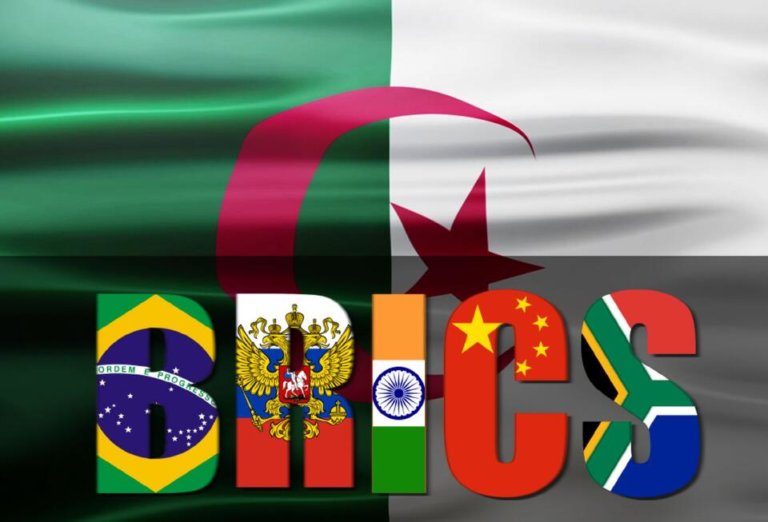Algeria Seeks BRICS Membership, Plans $1.5 Billion Contribution to Group Bank

Algeria Seeks BRICS Membership, Plans $1.5 Billion Contribution to Group Bank
Algerian President Abdelmadjid Tebboune announced that his country has formally applied for membership in the BRICS group, a prominent association of emerging economies. In their bid to join the influential bloc, Algeria has also submitted a request to become a shareholder member of the BRICS Bank, pledging an initial investment of $1.5 billion. This move reflects Algeria’s desire to enhance its economic ties and collaboration with other BRICS nations, which could potentially lead to significant opportunities for mutual growth and development.
By seeking entry into the BRICS group and expressing interest in becoming a shareholder member of the BRICS Bank, Algeria aims to position itself as a proactive participant in the global economic landscape. The proposed investment of $1.5 billion underscores Algeria’s commitment to actively contribute to the financial stability and cooperative efforts within the BRICS community. If accepted, Algeria’s inclusion in the BRICS group and its involvement with the BRICS Bank could open up avenues for increased trade, investment, and cooperation, providing potential benefits to both Algeria and the existing BRICS member states.

During his visit to China, President Abdelmadjid Tebboune expressed Algeria’s intention to join the BRICS group to unlock fresh economic prospects. Algeria, known for its abundant oil and gas resources, is actively pursuing avenues to diversify its economy and forge stronger partnerships with key nations, including China.
Furthermore, Algeria’s interest in bolstering ties with China aligns with its broader strategy to foster mutually beneficial relationships with influential players in the global economic landscape. Given China’s prominent role as a major economic power, forging stronger partnerships could lead to increased investment, trade, and knowledge exchange, providing Algeria with a pathway to bolster its economic growth and development on multiple fronts.
Algerian President Abdelmadjid Tebboune confirmed that his country has officially applied for membership in the group, which consists of Brazil, Russia, India, China, and South Africa. This association represents a significant portion of the world’s population, accounting for over 40%, and contributes approximately 26% to the global economy.

As part of its bid to join the BRICS group, Algeria has taken steps to become a shareholder member in the BRICS Bank. In a letter addressed to the group, Algeria expressed its interest in participating in the bank’s operations, and it has pledged an initial contribution of $1.5 billion. This financial commitment highlights Algeria’s determination to actively participate in the economic endeavors and initiatives of the BRICS nations.
By seeking to join the group and become a shareholder member of the Bank, Algeria aims to unlock new economic opportunities and strengthen its ties with these influential economies. The potential inclusion in the BRICS bloc could offer Algeria a platform to enhance trade, investment, and cooperation with member nations, fostering economic diversification and growth within the country.
This week, South Africa’s top diplomat responsible for relations with the group of nations revealed that over 40 countries have expressed keen interest in joining the bloc. The BRICS group, comprised of Brazil, Russia, India, China, and South Africa, is known for its significant influence on the global economic landscape, accounting for a substantial portion of the world’s population and economy.

The fact that more than 40 countries are eager to be part of the BRICS group underscores the bloc’s growing appeal and perceived benefits for nations seeking to enhance their economic cooperation and global standing. The interest expressed by these countries signals a recognition of the potential advantages that BRICS membership can offer in terms of trade, investment opportunities, and collaboration on various economic and developmental initiatives.
This week, it has been reported that several countries, including Argentina, Iran, Saudi Arabia, the United Arab Emirates, Cuba, the Democratic Republic of Congo, Comoros, Gabon, and Kazakhstan, have expressed interest in joining the BRICS group of nations. This reflects the growing appeal of the bloc as a platform for enhanced economic cooperation and collaboration among countries from different regions and economic backgrounds.
In another significant development, China has made a substantial commitment to invest $36 billion in Algeria. The investment will span various sectors, including manufacturing, new technology, the knowledge economy, transport, and agriculture. This investment indicates China’s interest in strengthening its ties with Algeria and supporting the development of key sectors in the country. It also highlights Algeria’s attractiveness as a destination for foreign investment and signifies the potential for mutual economic growth and cooperation between the two nations.

Such investments from major economies like China can significantly contribute to Algeria’s economic diversification and growth. Additionally, the interest expressed by various countries in joining the group underscores the bloc’s increasing influence and potential for fostering beneficial partnerships on a global scale.




